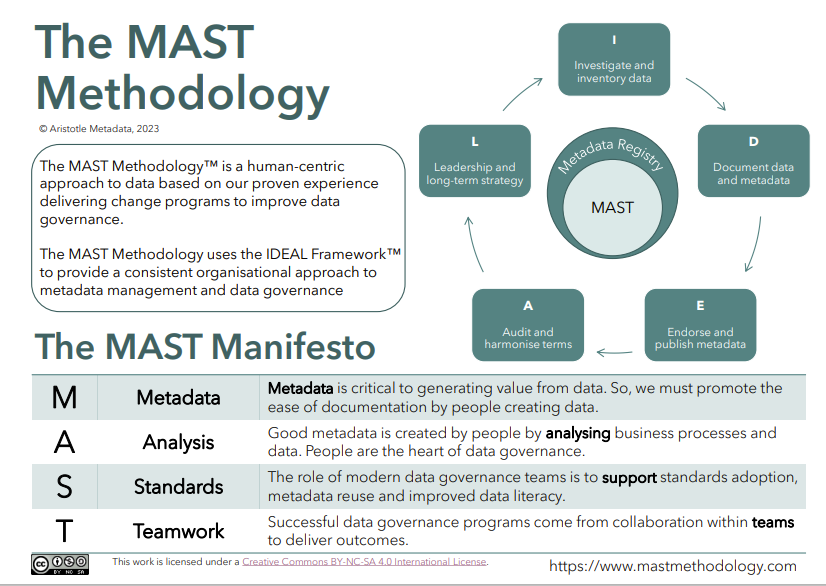The MAST Manifesto
The MAST Manifesto provides a shared belief of why data governance is important and the skills, culture and actions required for organisations can achieve good metadata governance.
Metadata
Metadata is critical to generating value from data. So we must promote the ease of documentation by people creating data.
Analysis
Good metadata is created by people by analysing business processes and data. People are the heart of data governance.
Support
The role of modern data governance teams is to support standards adoption, metadata reuse and improved data literacy.
Teamwork
Successful data governance programs come from collaboration within teams to deliver outcomes.
The IDEAL Metadata Framework
The IDEAL Metadata Framework is a pragmatic, step-by-step maturity model to help organisations tackle the right challenges at the right time. Each step is designed to improve the data maturity of the organisation, improve data culture and make data more accessible and interpretable.
At each step, the IDEAL Framework also specifies key risks and pitfalls that are common in data governance to ensure your organisation doesn't lose sight of its end goals and objectives.
| Goals | Actions | Pitfalls | ||
|---|---|---|---|---|
| I | Investigate & inventory data | Increased knowledge of existence of data assets and their location | Just write it down; some documentation is better
than no documentation
Document then refine data assets Providing search tools to improve discovery |
Balance comprehensive inventory with achievable goals
Focus on assets that have value and interest |
| D | Document data & metadata | Increased understanding of the structure and content of data |
Document data “as is” to improve adoption
Capture data dictionaries in machine readable formats Using standards like ISO11179 to provide consistent metadata capture |
Don’t try to harmonise terms too early
Resist “improving” definitions |
| E | Endorse & publish | Increased buy-in from external stakeholders through a shared understanding of data | Share documentation with others
Record approval processes Be comfortable with sharing information regardless of “quality” Operationalise peer review for metadata |
Don’t let documentation become stagnant or forgotten
Build trust by describing who has approved publication of data assets |
| A | Audit & harmonise | Improved comparability and interoperability of data | Build consensus through broad stakeholder engagement
Ask how different users interpret data and terms Maintain audit records to capture changes over time |
Don’t force agreement, as terms may differ for a reason
Five similar documented terms may be redundant, but adoption is better than “correctness” |
| L | Leadership & long-term strategy | Increased knowledge retention about data | “Land and expand” adoption through examples others can follow
Find opportunities with interested business areas Make onboarding easier for users |
Don’t assume leadership is “someone” else’s job – leading by example is something everyone can do
Don’t try change the world – engage with areas that want to change first |
Resources and tools
Download our Creative Commons CC-SA-BY handout to share, remix and use.
If you have comments or questions or would like to share your experiences implementing the MAST Methodology join the Aristotle Metadata community to share your thoughts.
Watch the MAST launch video to learn more about how the MAST Methodology was developed and how it can help your organisation make your data make sense.
